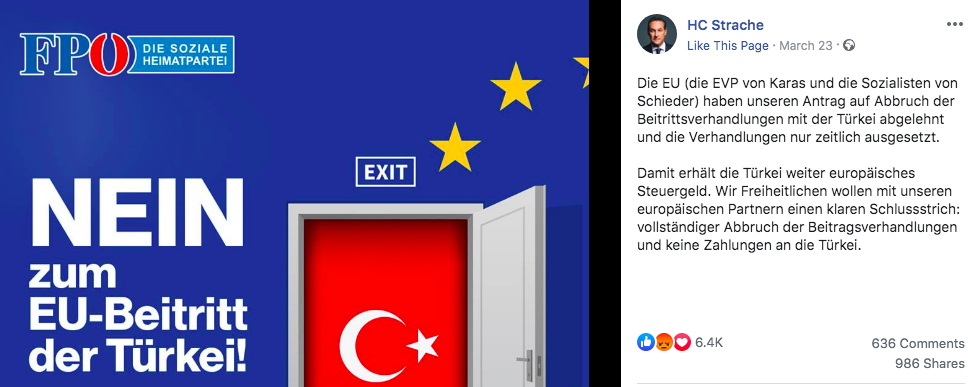The relationship between the EU and Turkey has been turbulent and difficult for many years. There has been a lot of dispute. Throughout the recent debate we came across a Facebook posting of Heinz-Christian Strache, leader of the Austrian populist right-wing party Freiheitliche Partie Österreichs (FPÖ).
In this posting Strache states that the FPÖ demands to stop the accession negotiations with Turkey. Strache further claims Turkey still continues to receive “European tax money”. Is this true? Our task was to find out.
The claim of Strache is stated as a fact in contrast to personal opinions or wishes, for example like the wish of the party to kick Turkey out of the negotiations completely. Therefore, it was checkable and we could start with our research. Having the statement without much more information, the first thing to do was simply read about the negotiations to gain more context. Soon a lot of criticism about the investment of the received money emerged. Furthermore we realized that the conflicts have existed since the beginning of the accession negotiations with Turkey. After reading more about the topic and the tensed relations to have a better understanding of the demand by the far right, it was necessary to deconstruct the statement of the posting.
Our focus was on the statement that Turkey receives European tax money. Two main questions arose: Does Turkey actually receive money from the EU and secondly, is this taxpayers’ money? Subsequently, the next step was a search for official EU documents.
We first wanted to clarify if EU money equals European tax money. The official web page of the European Union contains the composition of the EU budgets. The largest source with around 70 percent of its total funding stems indeed from national contributions of member states. This resource is based on the Gross National Income of each state which means that the amount varies from one year to another. Therefore if it turns out to be true, that Turkey receives money, it would definitely tax money of the EU-countries.
With that off the table, we focused on the search of official information about financial conventions. Again, the official EU-website contained two financial agreements which gave us answers to our first question:
1. the EU funding program IPA II
2. the “refugee agreement” or EU facility for refugees in Turkey
- IPA I and II is short for the “Instrument for Pre-Accession Assistance” and is a funding mechanism of the EU. It offers funding to all EU candidate countries, which by now are five, and further to potential candidates like Bosnia and Kosovo. The funding should be invested in different projects in economic recovery, education, energy supply, the environment and agriculture. The main goal is to lead the countries up to the standards of the EU and thereby enable a membership. IPA I lasted from 2007-2013 with a budget of €11.5 billion in total. IPA II continues with the pre-accession assistance for the period 2014-2020 with €11.7 billion. The share for Turkey was in IPA I €4.8 billion and in IPA II €4.5 billion. Also to receive this money it is a requirement to be a candidate country.
- The “refugee agreement” is stated in a document of the European commission as the “answer to the EU Member States’ call for significant additional funding to support refugees in the country” with a total of €6 billion. The focus includes “humanitarian assistance, education, health, municipal infrastructure, and socioeconomic support”.
This showed that Turkey gets money from the EU through two ways. So Strache’s statement proved to be true. More than that it told us something about political motives and strategies. If Turkey receives money either way because the agreement is not bound to the condition of being an EU candidate, it weakens the demand to stop the negotiations in order to stop giving European money to Turkey.
It is also interesting to note that the EU facility funding for refugees was a deal made to stop refugees come to the EU, which is well in line with the main issue of the nationalistic party to stop immigration. In conclusion, giving European tax money to Turkey should be in the interest of the FPÖ, as they claim to want less migration to Austria. This shows, how a fact can be put in another perspective and change the meaning completely, while still remaining a fact. For us, this was the most valuable insight that we could gain from this fact-checking process.







